Aloe Vera Mask Benefits for a Natural Glow
Aloe vera in masks offer the following benefits:
- Hydration Boost: They replenish the skin’s moisture, giving it a fresh and dewy look.
- Anti-inflammatory Properties: The natural compounds in aloe vera can calm and soothe irritated skin.
- Vitamin Enriched: Packed with vitamins like C, E, B-12, and essential nutrients, these masks rejuvenate and fortify the skin.
- Multipurpose Benefits: Beyond moisturizing, aloe vera can act as a base before makeup, a gentle makeup cleanser, and even a remedy for scalp issues.
- Sunburn Relief: Known for ages, aloe vera is a go-to remedy for sunburned skin, providing immediate relief.
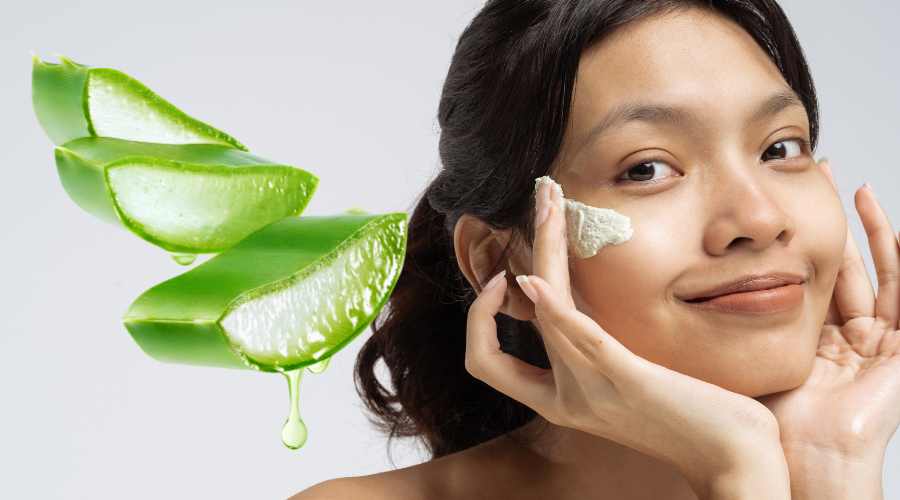
What Exactly is an Aloe Vera Mask?
An Aloe Vera mask is a skincare product that harnesses the natural benefits of Aloe Vera to nourish, soothe, and rejuvenate the skin.
The primary ingredient is the clear, jelly-like substance found in the inner part of the Aloe Vera leaf. This gel can be combined with other beneficial ingredients depending on the purpose of the mask, i.e. agave, turmeric, clays, botanical powders, infused herbal teas or essential oils to boost the mask’s effectiveness. See the video below for Aloe vera mask examples.
The mask is usually made by taking the transparent gel from the Aloe Vera leaf and blending it until it’s of a uniform texture. Based on what the skin requires and the intended results, the other ingredients can be added to the mix.
Aloe Vera masks can moisturise, calm irritations, address sunburns, and aid skin recovery. The plant’s inherent nutrients, enzymes, and vitamins work wonders for skin revitalisation.
What Are Aloe Vera Masks Benefits?
An Aloe Vera mask can be beneficial in several situations due to its versatile properties.
Find below examples when you might want to consider using one.
Always consult a healthcare professional if you are trying Aloe vera for the first time. Also, it is important to do a patch-test before applying.
1. Aloe Vera Mask Benefits for Sunburn Relief

If you’ve spent too much time in the sun and your skin feels burnt or irritated, an Aloe Vera mask can provide soothing relief and aid in skin repair.
Aloe Vera’s Components and Their Benefits
- Polysaccharides: The gel from the Aloe Vera leaf is rich in polysaccharides like glucomannan and acemannan. These elements encourage skin growth and recovery, aiding in the swift healing of sunburnt skin.
- Vitamins & Antioxidants: Aloe Vera boasts vitamins C and E. These antioxidants help shield the skin from further harm and lessen inflammation.
- Enzymes: Present in the gel are enzymes that diminish inflammation, soothe pain, and support skin recovery.
- Minerals: Essential minerals in Aloe Vera, such as zinc, help tighten pores, while magnesium lactate can relieve itching sensations.
- Amino Acids: Aloe Vera gel is packed with amino acids, vital for the regeneration of skin damaged by the sun.
This 2023 study discovered that Aloe Vera gel notably sped up the healing of epidermal wounds and this 2022 research underlined the effectiveness of Aloe Vera in treating burn injuries, highlighting its potential for sunburn relief.
2. Aloe Vera Mask Benefits for Dry Skin
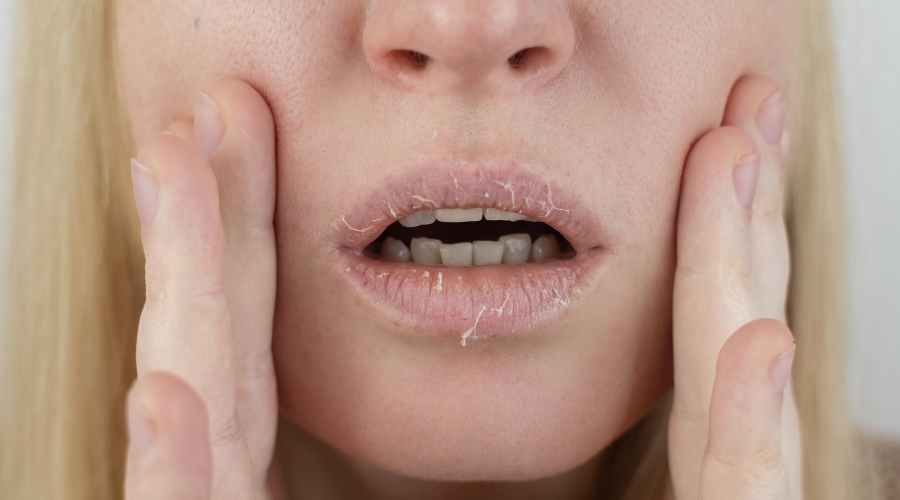
When skin lacks moisture, it can become dry, flaky, and uncomfortable. This can be due to environmental factors, ageing, or even daily routines. Aloe Vera offers a solution to these skin woes. Here’s an insight into its moisturising prowess:
Aloe Vera’s Components and Their Benefits
- Polysaccharides: These are moisture-binding agents found in Aloe Vera that help the skin lock in hydration, preventing it from drying out.
- Vitamins: Aloe Vera is enriched with vitamins, particularly vitamin E, renowned for its hydrating properties and its role in strengthening the skin’s protective barrier.
- Amino Acids: These are essential for skin health. Aloe Vera provides amino acids that help to soften and hydrate the skin’s surface.
- Enzymes: These natural compounds assist in shedding dead skin cells, revealing a more hydrated and radiant layer underneath.
- Minerals: Among the various minerals in Aloe Vera, magnesium lactate stands out for its ability to reduce the itchiness often associated with dry skin.
This 2023 study looks into Aloe vera’s potential in enhancing skin hydration. This research from 2022 points at the hydrating attributes especially when used together with complementary natural ingredients. Another 2022 study highlights Aloe vera’s moisturising abilities suggesting its efficacy in addressing dry skin challenges.
3. Aloe Vera Mask Benefits for Acne or Acne Breakouts
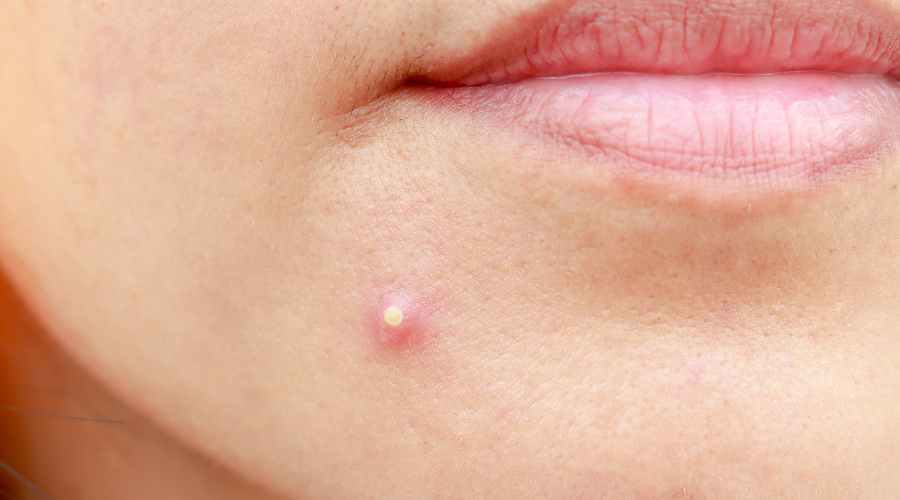
The anti-inflammatory nature of Aloe Vera can help tone down the redness and swelling from breakouts.
Aloe Vera’s Components and Their Benefits
- Anti-inflammatory: Aloe Vera is packed with compounds that help diminish skin inflammation, making it a valuable ally in reducing the severity of acne and associated redness.
- Antibacterial: The gel naturally combats bacteria, particularly those that lead to acne, helping to keep breakouts at bay.
- Vitamins: Rich in vitamins, notably vitamin E and C, Aloe Vera aids in repairing damaged skin and lessening the visibility of acne scars.
- Salicylic Acid: Present in Aloe Vera, this acid is known for its prowess in clearing pores and addressing acne directly.
- Enzymes: These compounds play a role in curbing inflammation and fostering skin repair, making them particularly beneficial for skin prone to acne.
This study from 2022, revealed that preparations of Aloe Vera gel showed antibacterial activity against Propionibacterium acnes. The research deduced that a gel with a 10% concentration of Aloe Vera ethanol extract was most effective in inhibition. Another piece of research from 2022, underscored the anti-inflammatory capabilities of Aloe Vera, indicating its potential benefits in relieving inflammation linked to various conditions, including acne.
4. Aloe Vera Mask Benefits for Post-Skin Treatments
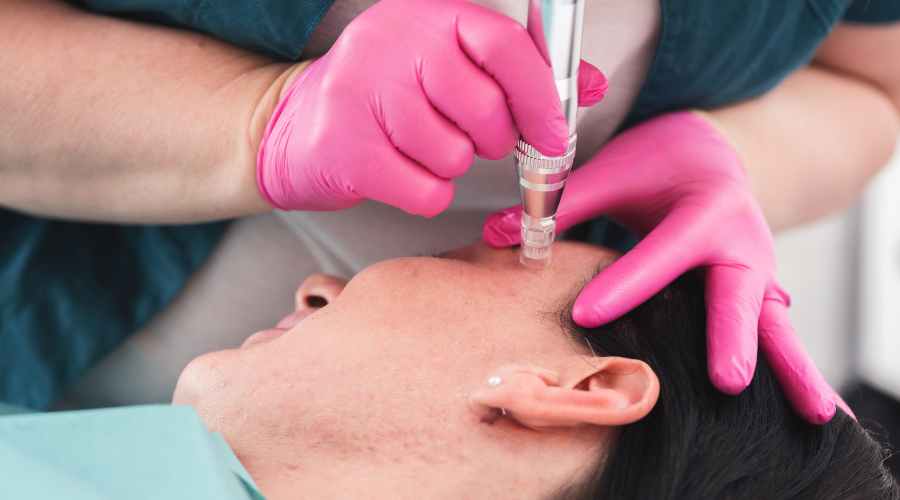
Post treatments like peels or lasers, Aloe Vera can be a gentle way to comfort and aid skin recovery.
Aloe Vera’s Components and Their Benefits
- Calming Effects: Aloe Vera is celebrated for its ability to offer relief, making it ideal for comforting skin post-procedure.
- Reduction of Inflammation: The gel is adept at curbing inflammation, which can be particularly useful in minimising post-treatment redness and irritation.
- Promotion of Healing: Aloe Vera encourages the production of certain growth factors that assist in the skin’s natural healing journey.
- Nutrient-Rich: Laden with vital vitamins and minerals, Aloe Vera ensures the skin receives the nourishment it needs, especially after undergoing treatments.
- Hydration: Aloe Vera imparts moisture to the skin, addressing any dryness that might arise post certain skin treatments.
This 2023 research piece discusses Aloe Vera’s potential in skin regeneration and recovery, especially when exposed to detrimental factors. This 2022 study discusses Aloe Vera’s anti-inflammatory properties, indicating its role in managing inflammation in various scenarios, including after skin treatments. This other 2022 study highlights Aloe Vera’s effectiveness in supporting the healing process of radiation dermatitis, a common aftermath of certain skin procedures.
5. Aloe Vera Mask Benefits for Sensitive Skin
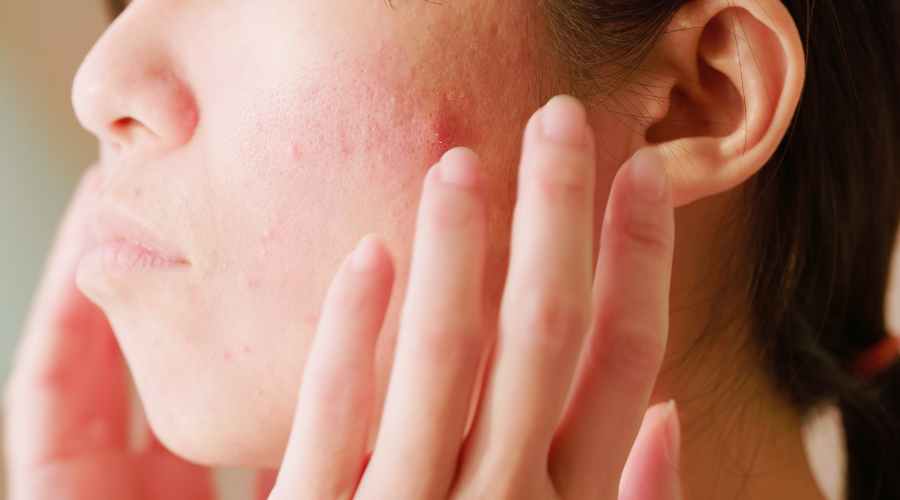
If your skin reacts quickly or you’ve had a product mishap, Aloe Vera can be a calming solution.
Aloe Vera’s Components and Their Benefits
- Soothing Nature: Aloe Vera stands out for its calming capabilities, making it a go-to for individuals whose skin is easily irritated.
- Reduction of Redness: The gel can diminish inflammation and associated redness, often a concern for sensitive skin types.
- Natural Hydration: Aloe Vera ensures the skin remains hydrated without causing any heaviness or greasiness, a balance crucial for sensitive skin.
- Essential Nutrients: Laden with vital vitamins and minerals, Aloe Vera fortifies and shields the skin, enhancing its natural barrier.
- Protection from External Factors: Aloe Vera’s antioxidants play a pivotal role in safeguarding sensitive skin from potential environmental aggressors.
This 2022 research piece discusses the preference for natural skin care solutions, particularly for those with sensitive skin tendencies. The findings revealed that many participants leaned towards the direct use of plant-based remedies, with Aloe Vera emerging as a top pick. This 2020 investigation highlighted the significance of stable formulations containing Aloe Vera, particularly formulated for sensitive skin. The research indicated the positive impact of Aloe Vera emulsions in diminishing inflammation and boosting skin well-being.
6. Aloe Vera Mask Benefits for Mature skin

To tackle early wrinkles or skin sagging, the antioxidants in Aloe Vera can give your skin a youthful boost.
Aloe Vera’s Components and Their Benefits:
- Antioxidant Power: Aloe Vera brims with antioxidants that ward off free radicals, known culprits of skin ageing. These antioxidants play a pivotal role in preserving the skin’s youthful glow.
- Vitamin E: Found in Aloe Vera, vitamin E is celebrated for its hydrating qualities and its prowess in enhancing skin elasticity, thereby diminishing wrinkle appearance.
- Polysaccharides: These elements in Aloe Vera ensure the skin stays hydrated and bolster the skin’s natural barrier, especially vital for ageing skin.
- Barbaloin: This robust antioxidant present in Aloe Vera aids in skin revitalisation and offers a shield against external aggressors.
- Boosting Collagen: Aloe Vera encourages the synthesis of collagen, a key protein for maintaining skin tautness and addressing sagging concerns.
This 2022 research underscores the synergistic benefits of Aloe Vera and vitamin E in tackling ageing signs revealing improvements in skin conditions, including wrinkle reduction. This 2020 investigation highlighted Aloe Vera’s capabilities in enhancing skin hydration, firmness, and suppleness, whilst also curbing transepidermal water loss, a common concern in mature skin. Another 2020 study showcased the amplified anti-wrinkling attributes of Aloe Vera when paired with lactic acid fermentationthe benefits occur from the combined effects of antioxidants and specific polysaccharides in Aloe Vera.
6. Aloe Vera Mask Benefits for General Skincare Routine
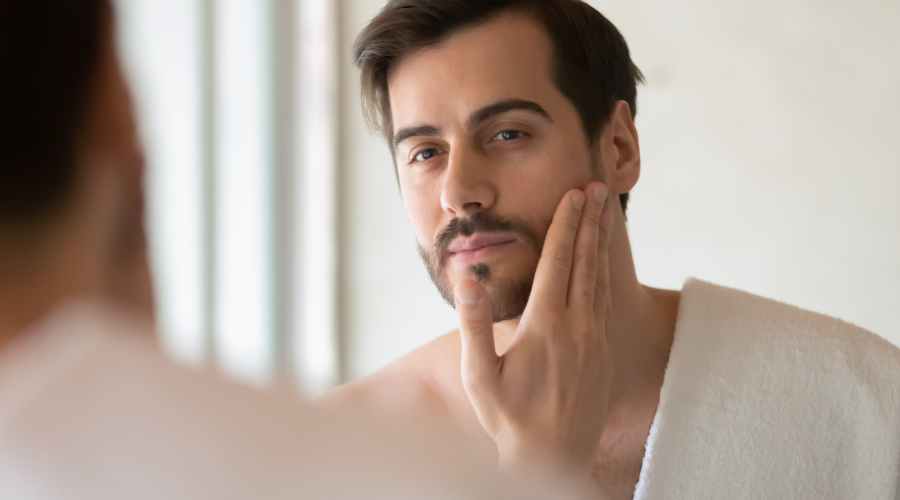
Even without specific issues, an Aloe Vera mask can be a refreshing addition to your skincare ritual for that extra glow.
Aloe Vera’s Components and Their Benefits:
- Antioxidants: Aloe Vera is rich in antioxidants that help combat environmental stressors, which can lead to early signs of ageing. These antioxidants play a pivotal role in maintaining a luminous complexion.
- Vitamin E: Present in Aloe Vera, this vitamin is celebrated for its ability to keep the skin moisturised, ensuring it feels soft and looks radiant.
- Polysaccharides: These compounds in Aloe Vera help lock in moisture, ensuring the skin remains dewy and revitalised.
- Barbaloin: Found in Aloe Vera, this powerful component rejuvenates the skin and offers protection against potential damage.
- Amino Acids: Aloe Vera is packed with essential amino acids that feed the skin, ensuring it remains smooth and glowing.
A 2017 research paper recognises the long-standing use of Aloe Vera in skincare. Another 2017 investigation looks into the importance of topical solutions like Aloe Vera in skincare.
Remember, while Aloe Vera is generally safe for most skin types, it’s always a good idea to do a patch test before applying any new product or ingredient to your entire face.
Other Specific Benefits of Aloe Vera for Skincare
1. Promotes Collagen Production: Aloe Vera has the ability to invigorate fibroblasts, the cells that produce collagen. This results in enhanced skin suppleness and a diminished presence of wrinkles. This interesting 2023 study discovered that a unique component of Aloe vera bark increases collagen production in skin cells by 22%, hinting at potential for younger-looking skin.
2. Exfoliates Dead Skin Cells: Aloe Vera contains enzymes that naturally shed dead skin cells, paving the way for a clearer and more radiant skin surface.
3. Tightens Pores: Thanks to its natural tightening qualities, Aloe Vera can minimise the visibility of large pores, bestowing a smoother skin appearance.
4. Enhances Skin’s Natural Defence: Though more research is needed, there’s a belief that Aloe Vera strengthens the skin’s protective layer, helping it resist external irritants and stay resilient. This study showed that Aloe vera effectively improved the skin’s natural barrier, especially in the palm area, by enhancing hydration and balancing pH levels.
5. Protects Against Environmental Stressors: Aloe Vera’s rich antioxidant content acts as a shield, protecting the skin from environmental threats like pollutants and harmful sun rays, which can hasten the ageing process. This study highlights the impact of oxidative stress on the skin, emphasising how factors like UV rays and pollutants can accelerate skin aging. The research also looks into the protective roles of antioxidants, such as vitamin C, resveratrol, and ferulic acid, in combating these environmental stressors.
What Can I Mix in my Aloe Vera Mask?
Herbal Infusions:
- Chamomile: Known for its calming properties, it can soothe irritated skin. Mix 2 tbsp of Aloe Vera gel with 1 tbsp of chamomile tea infusion.
- Green Tea: Packed with antioxidants, it can help rejuvenate the skin. Combine 2 tbsp of Aloe Vera gel with 2 tsp of cooled green tea.
- Lavender: Its aromatic essence can provide relaxation while benefiting the skin. Blend 2 tbsp of Aloe Vera gel with 1 tbsp of lavender tea infusion. s
Powders for a Boost:
- Turmeric: A natural anti-inflammatory and brightening agent. Add a pinch of turmeric to 2 tbsp of Aloe Vera gel.
- Calendula Powder: Renowned for its healing properties, especially for sensitive or damaged skin. Mix 1 tsp with 2 tbsp of Aloe Vera gel.
- Rose Petal Powder: Offers a gentle exfoliation and imparts a natural glow. Combine 1 tsp of the powder with 2 tbsp of Aloe Vera gel.
Natural Oils:
- Jojoba Oil: Mimics the skin’s natural oils, providing hydration without clogging pores. Add 1 tsp to 2 tbsp of Aloe Vera gel.
- Tea Tree Oil: A boon for acne-prone skin due to its antibacterial properties. Mix 2-3 drops with 2 tbsp of Aloe Vera gel.
- Rosehip Oil: Rich in essential fatty acids and vitamins, it’s great for skin rejuvenation. Blend 1 tsp of the oil with 2 tbsp of Aloe Vera gel.
Fresh Ingredients:
- Cucumber: Provides a cooling effect and helps reduce puffiness. Mix 2 tbsp of Aloe Vera gel with 1 tbsp of cucumber juice.
- Agave: Acts as a natural humectant, drawing moisture into the skin. Combine 2 tbsp of Aloe Vera gel with 1 tbsp of agave nectar.
- Lemon Juice: Can brighten the complexion but should be used sparingly to avoid irritation. Add a few drops to 2 tbsp of Aloe Vera gel.
Grains and Exfoliants:
- Oatmeal: Offers gentle exfoliation and is soothing for the skin. Blend 1 tbsp of oatmeal with 2 tbsp of Aloe Vera gel.
- Coffee Grounds: A natural exfoliant that can also invigorate the skin. Mix 1 tsp with 2 tbsp of Aloe Vera gel.
- Brown Sugar: Helps in sloughing off dead skin cells, revealing a smoother complexion. Combine 1 tbsp of brown sugar with 2 tbsp of Aloe Vera gel.
Clays for Detoxification and Clarity:
- Kaolin Clay: Mix 1 tbsp of Kaolin clay with 2 tbsp of Aloe Vera gel. Suitable for sensitive skin as it’s gentle and doesn’t draw out oils aggressively.
- Bentonite Clay: Combine 1 tbsp of Bentonite clay with 2 tbsp of Aloe Vera gel. Great for oily skin and deep detoxification.
- French Green Clay: Blend 1 tbsp of French green clay with 2 tbsp of Aloe Vera gel. Ideal for removing impurities and tightening pores.
- Rhassoul Clay: Mix 1 tbsp of Rhassoul clay with 2 tbsp of Aloe Vera gel. Known for its elasticity-boosting properties.
Remember, always do a patch test when trying out new ingredients to ensure there’s no adverse reaction.
How to Make Your Aloe Vera Mask
- Gather Your Ingredients:
- Fresh Aloe Vera leaf (or high-quality Aloe Vera gel from the store)
- Optional additives (e.g., agave, turmeric, essential oils) based on your skin’s needs.
- Extract the Gel:
- Rinse the leaf under cold water to remove any dirt or impurities.
- Cut the bottom part of the leaf, this is where the leaf is thickest and contains the most gel. By cutting this part, you allow the yellowish latex (aloin) to drain out.
- Place the cut leaf in a bowl with the cut side down. Allow it to sit for about 2 hours to let the aloin drain out. This yellowish substance can be irritating to the skin, so it’s essential to remove it.
- After the aloin has drained, use a knife to slice off the thorny edges of the leaf. Then, with the flat side up, slice the leaf open. You will see the clear Aloe Vera gel inside. Use a spoon to scoop out the gel.
- Blend for Consistency:
- Place the extracted gel in a blender or bowl.
- Blend or mix until you achieve a smooth, even consistency.
- Add the other ingredient(s) and mix til achieving a smooth consistency.
- Application:
- Start with a clean face.
- Using your fingers or a brush, apply the mask evenly, avoiding the eye area.
- Leave on for 15-20 minutes.
- Rinse and Moisturise:
- Gently wash off the mask with lukewarm water.
- Pat your face dry with a soft towel.
- Follow up with your regular moisturiser or serum.
- Store Any Leftovers:
- If you’ve made more than you need, store the remaining mixture in an airtight container in the fridge. Use within a week for best results.
Remember, the gel can be used immediately or stored in an airtight container in the refrigerator for up to a week. If you notice any signs of spoilage, discard the gel.
Which is Better: DIY Aloe Vera Mask or Purchasing Pre-made?
There are pros and cons to both. I make my own DIY aloe vera gel from the plants, but I understand that not everyone has a plant at home or the time to make the gel.
Going the DIY Route:
- Personal Touch: Adjust the mask’s ingredients to perfectly match your skin’s desires.
- Freshness: Using a just-cut Aloe Vera leaf ensures you’re tapping into the freshest benefits.
- Pure and Simple: Making it at home means you’re in control, with no unexpected additives.
- Aloe Vera in Powder Form: If you can’t get fresh leaves, Aloe Vera powder is a handy backup, preserving many benefits.
Opting for a Pre-made Solution:
- Ease and Speed: Ideal for those without easy access to fresh Aloe Vera sources.
- Tested Formulas: Commercial masks offer a tried-and-true mixture, vetted for skin friendliness.
- Boosted Benefits: Many ready-to-use masks blend Aloe Vera with other skin-enhancing ingredients, offering a more holistic approach.
Combining Store-Bought Gel with DIY Ingredients:
Convenience with a Personal Touch:
Opting for a store-bought Aloe Vera gel? No problem. You can still sprinkle in a bit of your own flair. Buy a good quality organic Aloe Vera gel and then jazz it up with your chosen ingredients right at home. This method marries the handiness of a ready-made gel with the joy of adding your own twist. From aromatic essential oils to calming herbal concoctions, the possibilities are endless, allowing you to craft a mask that’s just right for your skin.
Tips for Using Aloe Vera Masks:
Freshness Matters: When using an Aloe Vera mask, sourcing gel straight from the leaf provides the most immediate and potent benefits. If you’re opting for store-bought gel, choose one that’s reputable and free from unwanted chemicals.
First, Test: Before introducing any new mask to your routine, always conduct a small patch test. This ensures your skin is compatible with the ingredients.
Eyes Off Limits: Remember, the area around your eyes is especially delicate. It’s best to avoid this region when applying the mask.
How Often?: Your skin’s requirements will guide you, but typically, an Aloe Vera mask can be applied anywhere between once to three times weekly.
Side Effects and Cautionary Notes
While Aloe Vera is generally safe for most people, it’s essential to be aware of potential side effects and exercise caution when using it, especially for the first time.
- Skin Sensitivities: While rare, some people might experience allergic reactions to Aloe Vera. Before applying a full mask, test a small patch of skin. If you observe any signs of irritation, such as itching or redness, it’s best to discontinue use.
- Concerns with Aloin: The yellowish substance, aloin, found just below the leaf surface, can sometimes cause skin discomfort. Ensure you’ve properly drained and washed the gel to reduce aloin content.
- Medicinal Interactions: If you’re on specific medications, especially for conditions like diabetes or heart-related issues, Aloe Vera might interfere. Always discuss with a doctor or pharmacist before adding Aloe Vera to your skincare regimen.
- Usage Limits: While Aloe Vera is beneficial, over-application can lead to skin issues like dryness. It’s recommended to use the mask 1-3 times weekly, adjusting based on your skin’s feedback.
- Ingredients in Commercial Products: When buying an Aloe Vera product off the shelf, scrutinise the ingredients. Some might contain unwanted chemicals or preservatives that could irritate the skin.
- Pregnancy Considerations: Topical use of Aloe Vera is typically safe, but oral consumption during pregnancy or while breastfeeding is advised against. Always consult with a medical professional if you’re pregnant or breastfeeding before using ANY Aloe Vera products.
It’s essential to remember that individual skin reactions can vary. Always pay attention to your skin’s responses and modify your routine if necessary.
Conclusion
And there you have it!
A detailed journey through the magic of Aloe Vera masks.
We’ve explored its numerous advantages, the ins and outs of crafting your own, and the essential precautions to keep in mind.
Whether you’re aiming to calm irritated skin, moisturise parched patches, or just introduce a rejuvenating element to your beauty regimen, Aloe Vera stands out as a reliable and effective companion.
Always be attentive to your skin’s responses, I’m already thinking about my next Aloe vera mask mix 🙂
FAQs
1. What are the benefits of using an aloe vera mask?
Using an aloe vera mask can help moisturize and hydrate the skin, soothe inflammation and redness, promote healing of acne or sunburns, and improve overall complexion.
2. How often should I use an aloe vera mask for best results?
For best results, it is recommended to use an aloe vera mask 2-3 times per week or as needed to maintain healthy and nourished skin.
3. Can I make my own aloe vera mask at home?
Yes, you can make your own aloe vera mask at home by combining fresh aloe vera gel with other natural ingredients like honey or yogurt for added benefits.
4. Are there any side effects associated with using an aloe vera mask?
While rare, some people may experience allergic reactions or skin irritations when using an aloe vera mask. It is recommended to do patch tests before applying it on the face and discontinue use if any adverse reactions occur.
